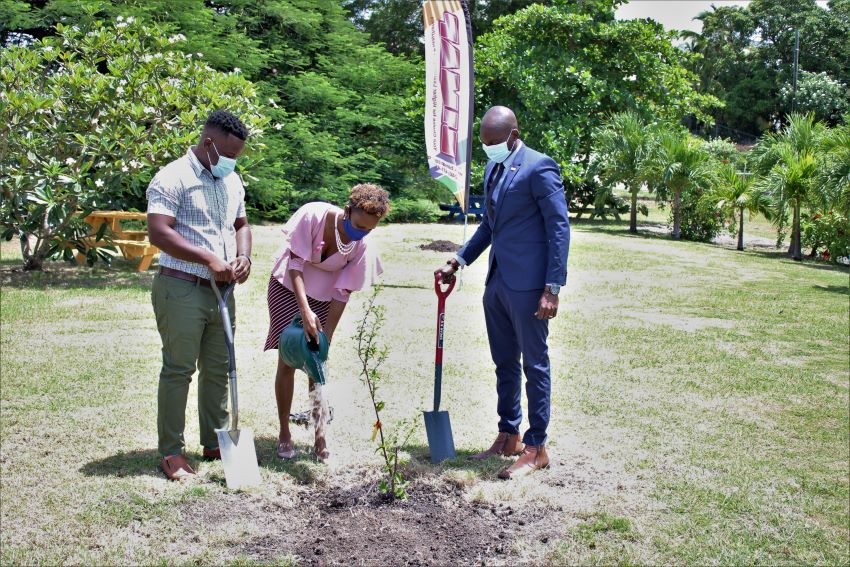
A critical component of the Barbados Institute for Management and Productivity’s (BIMAP) Greening Project is to pass on knowledge and expertise in renewable energy to this island’s youth while fulfilling the goals set by the institute in partnership with others.
This was underscored by its Chairman John Rocheford last Friday as he addressed the project launch at the institute’s Wildey, St. Michael headquarters and on the Zoom platform.
Following a description of actions already taken to green BIMAP, Mr. Rocheford said: “But we do not want to complete the journey alone, so we have included in our Greening BIMAP Project, some other critical components. We have partnered with the Samuel Jackman Prescod Institute of Technology (SJPI) to ensure that the knowledge of photovoltaic installations is passed on to the young people in our country.
“With this in mind, the SJPI will be providing the opportunity to train two young women and one young man with the provider Solar Watt Systems Inc. BIMAP recognises that the ratio of males to females in this field is skewed at the moment and that it is important to encourage more females to pursue careers in this field.”
The students will work alongside Solar Watt System Inc. to gather expertise and shared skills over the coming months while BIMAP, through best practices, is expected to reap benefits in a more efficient and effective way from the partnership.
According to the chairman, the BIMAP Greening Project, supported and funded by the United Nations Development Programme (UNDP), has already seen a significant reduction in the use of paper and ink, with the introduction of the e-learning platform. LED lights are replacing the incandescent bulbs and the plumbing fittings are being swapped for the more efficient, water-saving devices.
The Institute was also said to be steadily meeting the goals set with the UNDP. Mr. Rocheford noted that water tanks were being installed on the compound and while the institute’s initial aim was to reduce the amount of paper used by 25 per cent, this was surpassed with the move to the online delivery of all classes.
Future plans, he added, include the further beautification of the campus, through the planting of trees, the continued digitisation of the operations and acquiring additional water harvesting and irrigation equipment to enhance water conservation.
As part of the project launch, there was a tree planting exercise where National Coordinator of the Global Environment Facility (GEF) Small Grants Programme (SGP) UNDP, Dr. David Bynoe planted one of two Bajan cherry trees alongside BIMAP’s Quality Assurance and Research Assistant, Chevron Nesfield.

Dr. Bynoe, in earlier addressing the launch, commended the “outstanding educational institution” on its efforts to green and elaborated on the work his organisation had been doing – taking the lead in partnership with government to facilitate the development of the Blue and Green Economy at the community level and in facilitating the creation of Blue-Green initiatives by civil society organisations here.
“Over the last seven years, we have financed and made investments in over 90 projects in every parish of Barbados and raised awareness on these important issues in over 50 schools across Barbados. Specifically, as it relates to the Green Economy, we have supported, demonstrated, and replicated project initiatives within various aspects of the Green Economy,” he said.
He noted also that they continue to support civil society participation in the transition to renewable energy, providing low carbon energy access with co-benefits and they also support the creation and replication green farming models across Barbados, including climate smart agriculture, permaculture, and organic agriculture.
Dr. Bynoe added: “It is through SGP that the first Barbadian international organic farming inspectors were trained in the public sector, private sector and civil society. We have supported the creation of sustainable transport models in Barbados and the greening of the manufacturing sector with the aim of import substitution….We have become the mechanism for realisation of the green economy scoping study recommendations for Barbados at the community level.”
Those gathered were also reminded that the actions were part of the global SGP efforts to facilitate community action to achieve the Sustainable Development Goals including SDG 15 – Life on Land; SDG 7 – Affordable and Clean Energy and SDG 13 – Climate Action.
And, while Dr. Bynoe pointed out that the COVID-19 pandemic had impeded global efforts towards the SDGs, the National Coordinator of the GEF SGP of the UNDP acknowledged it had also presented an opportunity for a green, just, and equitable recovery.
